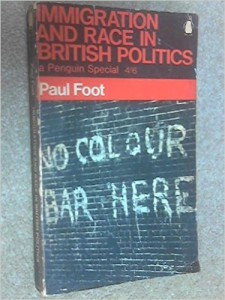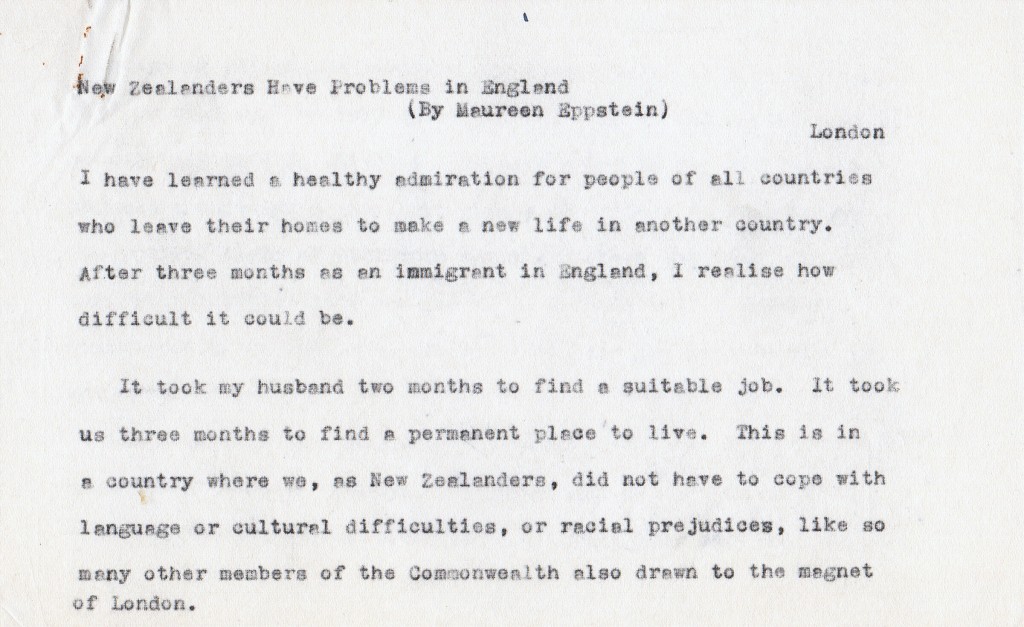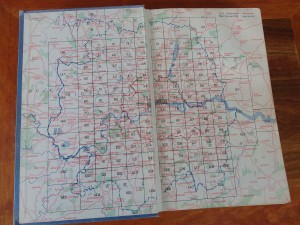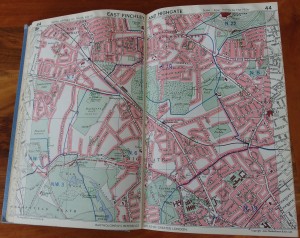Posts Tagged ‘race relations’
Droplets in an immigrant wave
In a 1962 article I wrote for my old paper, the Christchurch (NZ) Press, a draft of which I found in my old black filing cabinet, I wrote:
I have learned a healthy admiration for people of all countries who leave their homes to make a new life in another country. After three months as an immigrant in England, I realize how difficult it could be.
It took my husband two months to find a suitable job. It took us three months to find a permanent place to live. This is in a country where we, as New Zealanders, did not have to cope with language or cultural difficulties, or racial prejudice, like so many other members of the Commonwealth also drawn to the magnet of London.
We had no idea at the time of the hugeness of the immigration wave in which we floundered. To aid in post-war reconstruction in the 1950s, Britain had recruited labor from its colonies, primarily the West Indies and the Indian sub-continent. At that time people from the Empire and Commonwealth had unhindered rights to enter Britain. However, by the late 1950s, with the British economy faltering, racial prejudice reared its violent head. The Conservative Party government proposed legislation to make immigration for non-white people harder. One aspect of the proposed bill was to deny entry to dependents of immigrant workers. Before the Commonwealth Immigrants Act of 1962 could go into effect, the entry of dependents into Britain increased almost threefold as families attempted to beat the deadline. Total immigration from what was known as the New Commonwealth swelled from 21,550 in 1959 to 58,300 in 1960 and a record 125,000 in 1961.
Statistics are from Paul Foot, Immigration and Race in British Politics (Penguin, 1965)
All these people needed somewhere to live. It is no wonder then that rents soared and accommodations of any sort were snapped up. While Tony job-hunted, I haunted rental agencies for a short-term apartment (or flat, as they’re called in England) and, the hefty Bartholomews Atlas of Greater London under my arm, braved the Underground and navigated the suburbs. My letters to parents are full of observations like this one:
It’s amazing how so many of the little villages that have been absorbed into the city still retain their village atmosphere – you pop up from an Underground station and could imagine yourself miles out in the country – unless you happen to be on a bit of a rise, when you see nothing but houses as far as the eye can see. One place I visited, for instance, Muswell Hill, you had to go by bus through a very extensive patch of woodland to get to it. That place I didn’t take, incidentally, because the bath was in the kitchen – covered by a lift-up board and a little frilly curtain. When I mentioned this to another English landlady she didn’t even raise an eyebrow.
My letter continues:
We have now moved out of our hotel into a bedsitter out at Hampstead, for which we are being grossly overcharged – I guess we just took it in a moment of desperation.
The rent was six and a half guineas a week (the same buying power as about $200 in current U.S. dollars.) Every piece of furniture was shaky about the legs, and the cooking facilities were two gas rings crammed into a cupboard with about six inches of counter surface. The shared bathroom was down the shabby hall. I described the landlady as
a bit of a social type – she was too busy preparing for her cocktail party last night to attend to our wants, which brassed me off considerably. Still we get on quite well with her little dog, so with a little careful handling relations might improve.
Relations did not improve. Still vivid in my mind is one of our shouting matches. I had returned from the local laundrette with clothes still damp, in spite of multiple coin feeds to the drier, and had strung clothesline around the room. In walked Mrs. Ashley-Davis. “My furniture! My furniture!” she wailed, hand to her heart. Other disputes must have followed. In a letter to parents dated May 25, after giving the news that Tony had accepted a job near Windsor, I mention that we have given notice
…after some somewhat violent disputes with the landlady, in which I managed to lose my temper – catastrophe!
Finding permanent housing proved even more frustrating. I told my parents:
…for the last three or four days we have been footslogging, railriding, bussing, and generally getting fed up in a wide arc around the area…
We moved out to a hotel near Tony’s new job. My letters for the next few weeks are full of the false hopes and discouragements of the search. Finally we got lucky: a second floor flat in a Victorian brick semi-detached house just down the hill from Windsor Castle. A roof over our heads at last!
Here’s a modern Google Maps street view of the neighborhood. It still looks much the same.
Two Neighborhoods
In honor of Martin Luther King Day, I pulled out the manuscript of a novel I wrote around the time of his death. I had become involved as a volunteer in fair housing issues and wanted to write about what I was learning. I was a new immigrant to the US, clueless about racial issues in this country; the battered manuscript box has deservedly sat in the bottom drawer of an old filing cabinet ever since.
An incident based on my research for the book has stuck with me, however. The central character, a young woman newspaper reporter, works in Palo Alto, CA and goes to East Palo Alto, a black neighborhood just across the freeway, to interview a community organizer. Here are excerpts from a few paragraphs:
The afternoon was hot, and she was thankful for the shade of the overhanging trees as she drove down University Avenue toward East Palo Alto. She had never been there before. There had been nothing to go for. And she would have felt diffident about going to a black ghetto as a mere sightseer, even if it had occurred to her to do so.
As she came down the ramp on the other side of the freeway, she knew she was in a different country. The road was suddenly potholed and bumpy, and brown dust rose in thick choking swirls from its verges. She slowed and looked about her. Such tiny bedraggled houses, desperately in need of paint. Yards littered with junk, yet here and there a brave attempt at order and color. She came upon a few tatty shops. Surely this couldn’t be the main shopping center? Yet soon she could see the sign, NAIROBI SHOPPING CENTER, and underneath, in a language she could not understand, UHURU NA UMOJA.
Showing the predictable set of fears and prejudices about the African-American people she sees around her, the reporter parks her car and walks to her appointment, during which she is invited to sit in on a fair housing case.
She said goodbye, and walked slowly back to the car, past the Louisiana Soul Food Kitchen and the Black and Tan Barber. The heat and dust were almost unbearable.
Back across the freeway, she noticed for the first time the neatly swinging redwood sign: Welcome to Palo Alto. A few blocks further down University and it hit her like a punch in the gut. She pulled over to the side of the road and rested her head on the steering wheel, fighting back an impulse to vomit. The contrast was an obscenity. Huge magnolias here lined the street on both sides, giving deep dappled shade to the well-paved highway. Between the road and the white concrete sidewalks rose great greening mounds of juniper and ivy, and beyond them, with manicured lawns and discreet sprinkler systems, were the complacent mansions of the rich.



